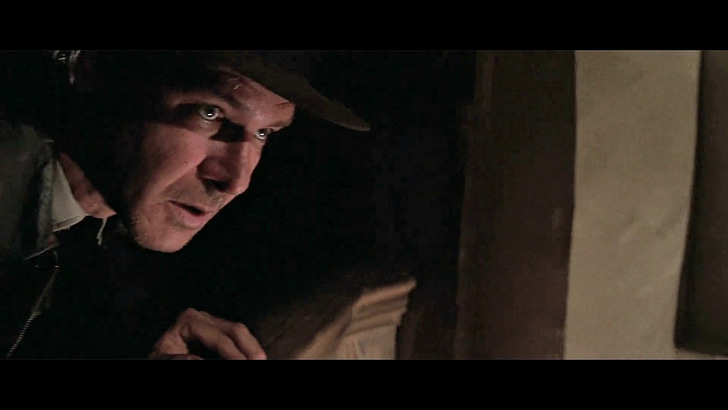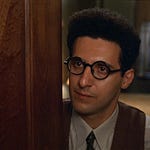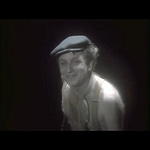Late at night last week in another country, my family and I talked with a Canadian couple about what America has come to. We agreed that what’s happening is bad, and I listed the good things that come to mind when I think of Canada: the Kids in the Hall, Alice Munro, Sidney Crosby, Leonard Cohen. “Where would we be without Leonard Cohen?” I said—though, to be honest, without Leonard Cohen I wouldn’t be different. Probably not at all. I like his songs, but I don’t know them well, not like I know the work of, say, Dave Foley, Bruce McCulloch, and the other Kids in the Hall.
If you could take everyone who is currently dismantling what passes for our federal government, and force them to watch one movie, read one book, listen to one album, spend an hour with one painting, or engage with an artifact from another artistic medium, in the hope that it might fix them somehow, and pull their souls back from the brink of hell—which is where they are currently going, and trying desperately to pull us all with them—then what would that book, movie, album, painting, poem, or whatever, be?
I, for one, would make them watch this 1982 film of a Randy Newman show that features appearances by Ry Cooder and Linda Ronstadt.
The government dismantlers would have to watch the whole thing. The only way it works is if you watch the whole thing.
Would it work? Would it solve the problem of them? No, not most of them. I know that.
Maybe the better question is this: when this is all over—and it will be over, someday, after more people die, and we all suffer a while longer, maybe a lot longer—how do we fix those who are responsible for all that is currently going down?
Let’s imagine they can be fixed. Let’s project a future in which there are consequences for those who do what are truly the worst things.
What does rehabilitation look like, for the lunatic who wants all our kids to get measles, so that only the strongest of them survive?
If they put me in charge of trying to fix our current Secretary of Health and Human Services, I would force him into detox for six months and subject him to mandatory viewings of that Randy Newman show and the 1966 John Frankenheimer film Seconds, in which an unhappy man is given another chance at his adulthood, and can pursue his dream of being an artist, rather than a guy behind a desk at a bank. Mere days into his new life, he finds that despite how he now looks like Rock Hudson and can paint all day long and have all the passionate sex he wants, he is still miserable.
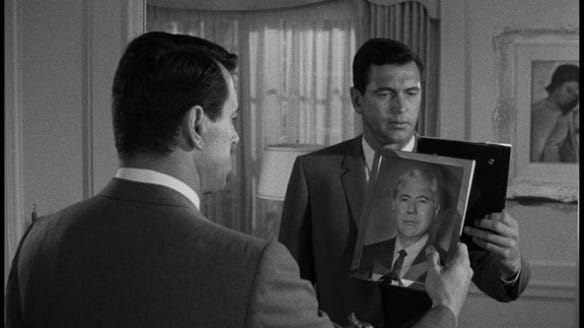
The cabinet member in my care would have to read “The Yellow Wall-Paper,” more than one time. He would have to read Song of Solomon and do chores.
I would probably not, in the name of solving his poisoned soul and mind, show that broken man the hottest new TV show on Netflix, the British show that's called Adolescence. I don’t think it would help get the job done.
If you don't know, Adolescence is a scripted show about a young teenage boy who murders a young teenage girl. The show spends its four episodes contemplating what led him to do that. It points fingers at the culture at large, the rhetoric that adolescent boys are exposed to via Instagram and elsewhere. Andrew Tate’s name comes up at least one time. Andrew Tate, if you don’t know, is an ugly man who brags online about treating women horribly in real life. I doubt he can be fixed.

Adolescence is, if nothing else, an interesting TV show. I don’t regret watching it. There is no denying the feats that it performs, with every hour-long episode consisting of one continuous shot. In the first installment, we start with a couple of detectives in a car, discussing apples, and follow them to the suspect’s house, where a SWAT team, or something like it, battering-rams the door and holds the family at gunpoint. They take the kid to the police station and interrogate him. As they go from place to place, via car, there are no cuts in the action.
It’s really something. The creators of the show must have had to choreograph everything the actors did with great meticulousness, especially on that first episode, with its police station full of people who walk through the frame in one direction or another. If even one of those blokes made a wrong move, like at minute forty-seven, they would have had to start all the way back again at the beginning.
The fourth episode shows us the family of the adolescent boy, who is away in prison, a year after he committed the murder. They are getting by and still trying to wrap their heads around what happened. In some of the final minutes, the mother and father do their best to determine where they went wrong, how they brought up a kid who would commit murder at age thirteen, and what elements of the outside world must have guided his hand as he stabbed his victim many times.
When that last episode ended, I felt a little bit like I had just watched an extended and technically impressive version of the anti-drug public service announcement from the 1980s, where a dad with a badass moustache finds his son’s drugs and congratulates him on finally becoming a man. At the end of the commercial, they get high together, and the dad says he wants to try DMT. He says he heard about it on a podcast, how sometimes when you take enough DMT you see an otherworldly woman who has appeared before other users of DMT, looking exactly the same in every hallucination, even if the person seeing her has never heard of her before. So it’s not like they were told about the DMT woman, and then had the hallucination based on the description they heard. She appears the same way to everyone, and it’s like she’s from another dimension.
Adolescence, the TV show, feels, in the end, something like the “Do you know where your children are?” public service announcement that would show up on people’s TVs in a prior era. It implores parents to pay attention to what their kids are seeing and hearing online, to ensure that they are safe and aren’t being corrupted by malicious online influencers.
That’s basically all that the show does, though. And it indicates, maybe, why it’s good that, in the history of filmmaking and the production of television shows, resourceful people invented editing. They pioneered techniques for playing with time frames, leaping hours or days ahead from one scene to another, and stitching moments from their characters’ lives together to make a coherent whole that can do more than show us things and remind us of dangers that are afoot.
I’m not sure that a show that’s filmed entirely in single takes that last an hour at a time can tell us much about where violence comes from, why it is that men are by and large so much more brutal than women, and how our individualized consumption of everything that is available to us online makes us unprecedentedly vulnerable to what we see there.
I have watched other shows that go way beyond where Adolescence takes us, when it comes to exploring the origins of violence, and what drives men to do the unfortunate things they sometimes do. One of them was another Netflix show, Mindhunter, which was concerned, on the one hand, with the actions of the most extremely violent men in society—serial killers—while, on the other hand, its real, more compelling drama involved the ways in which exposure to those men affected the ones who studied their crimes, how proximity to murderers of women changed other men’s attitudes toward women. Jessa Crispin wrote about this memorably for The Baffler—and let it be noted, please, that my brain is still working. I can remember, in 2025, with great clarity, something I read in 2017.
Mindhunter also had in it one of the actors from Alien 3.
Mindhunter was able to do what it did—raising big questions, exploring complicated themes—because of things like editing. It wasn’t trapped in the confines of one hour filmed in real-time, and because of that it was able to do more than simply show us things and make us aware of them. It didn’t forego the groundbreaking innovation of editing film, which was made in—uh, let’s see—in 1898, when Robert W. Paul directed the short film Come Along, Do!
I really did enjoy watching Adolescence. It was entertaining enough, and Erin Doherty is great. Stephen Graham is great. They got a great kid to play the bad kid. The mom seemed cool, and the actor who plays the sister looks an awful lot like one of my daughters. But Adolescence urges us all to pay attention to the potential for violence that people carry with them everywhere. It wants to show us how our circumstances and the culture we take in can bring out the worst in us. And that’s what a lot of TV shows are already doing.
It’s not just Mindhunter. The worldwide sensation Squid Game is about what happens when you put several hundred ordinary, desperate people in a situation where they face no consequences for killing one another, and are instead offered financial rewards for murder. Yellowjackets leaves a bunch of teenage girls in the Canadian wilderness, and we watch as they turn on each other; their circumstances strip away their hesitation to kill and eat other girls. American Primeval is about a woman who is forced by her circumstances to commit acts of violence. The English, a show I like more than all these others, features pretty much the same thing. In Better Call Saul, a crooked lawyer gets mixed up with violent people and finds himself involved in graver and graver crimes. It’s a spinoff of another show that’s also about that. Ripley is about a young man who isn’t violent at first, but who becomes a murderer in the name of personal gain. The Gentlemen is about an aristocrat who has to turn to criminality and violence in order to retain his status. I May Destroy You is an excellent, difficult series about a woman reckoning with the tremendous violence that has been done to her by a man. Harlots, which is very good, isn’t about physical violence so much as it depicts women who sell access to their bodies in order to escape poverty, when placed in situations where they barely have another choice. That seems similar enough to me to what we’re talking about, here.
I could go on. It just seems like Adolescence is screaming to us that we must pay attention to things that we’re already paying quite a lot of attention to. We just don’t know what to do about those things. And neither does the show.
This is why, if I ever make a TV show, I will go the extra mile and hire an editor. And if I had my way, I would have with me at all times a bushel of carrots.
I want to have a bushel of carrots. I want to have a steady supply of these bushels, so that I can always have them.
It’s what I have decided will be my next personality trait, my newest public-facing feature. If I’m waiting for my car’s oil to be changed, or having coffee at an establishment that serves it, I want to have carrots to munch on. If I’m at the club on a Friday night, I would like to have at my side some crisp, delicious carrots.
One of the reasons I want to do this is that carrots are good for you. They’re great for your eyes—and they’re delicious.
Carrots are my favorite vegetable. I do not say that lightly.
Competition for most favored vegetable status is fierce. Look at the contenders! You’ve got broccoli and Brussels sprouts. You’ve got garlic.
One of the things I like most about carrots is that they’re not Trojan horse fruits. A lot of vegetables that people say are their favorites are actually fruit. All forms of squash are fruit. They’ve got seeds inside them; they are fruit. Eggplant, zucchini, peppers, olives, tomatoes, avocadoes—they all have seeds inside. They are all fruit. Facts don’t care about your feelings.
Carrots are not fruit. There is no way to mistake them for fruit. There is no room inside of them for seeds, as they are utterly solid. Eating a carrot is like eating the inside of a wall.
My reasons for wanting to have carrots with me all the time go beyond nutrition and my love for the taste of carrots and everything else about them. I think it would be easier to talk to strangers while eating carrots than it would be to do it without eating carrots. I think there is nothing more welcoming, and more likely to put others at ease, than the sight of a man in a public place who is loudly eating carrots and who has enough to share.
Basically, what I’m trying to say is that I want to be Bugs Bunny.
And I want to urge everyone who reads this to at least consider purchasing and/or reading a couple of books that were published recently by writers I admire very much and am friends with. I like what they do so much, in fact, that I would use their work in the reprogramming camps for the monsters in power who are wrecking our lives.
One of the books is Moral Treatment, by Stephanie Carpenter, which takes place at one of the Kirkbride asylums that operated in the nineteenth and twentieth centuries. The protagonist is a young woman who gets sent to one with a diagnosis of “pubescent insanity.” It’s an excellent work of historical fiction by one of the best writers I’ve ever met.
Another of the best writers I’ve ever met is Maureen Stanton, whose latest book is a memoir, The Murmur of Everything Moving. I have only just started reading it—I had to talk to those Canadians first, and get that out of the way—but the prose is utterly arresting.
If you are Maureen-Stanton-curious but not ready to press the BUY button, read this essay she wrote about public bathing and jacuzzis and stuff like that. Be convinced that buying her book is a good idea.
I also want to say how much I enjoyed this post by Megan Cohen from Hearthfire Astrology. Although I am not myself a star or a planet, I like reading about astrology, and Cohen reminded me, when I read this, of something that astrology in general seems like it’s there partly to keep us in mind of: the things we are feeling don’t necessarily come exclusively from inside ourselves; there may be grand forces playing us like we’re musical instruments; and others might well be feeling the same things we are at the same time as us for that reason. I’m sure that’s not an accurate explanation of astrology.
But she writes in the post about what she was doing twenty years ago:
When the Aries eclipse cycle began in 2004, I was living in New York and waiting tables at an Italian bistro in Tribeca. A friend had gotten into Cooper Union and while I wasn't an artist myself, I could at least have the experience of proximity. I didn't really have the tools nor experience to examine what I was attempting to do or to be, let alone what I valued or believed. All I knew was that I had a lot of energy and nothing to do with it. I thought I could find something to do with it out there in the big, wide world. By the cycle's end in 2006, all my friends were graduating and shifting into their mature art practices. They didn't hang out so much. Some left for grad school. Others began new jobs. I got really lonely. Just as the last eclipse in the set took place, I moved back home to go to college and get a job doing something ordinary.
At the same time she’s writing about there, I was in a geographically very different place—Athens, Ohio—but I felt much the same about my place in life and the world. And I recognize myself from that time in the way Cohen writes about herself at that time. I felt lost, back then—much more lost than anyone else appeared to be.
I have been thinking quite a lot, lately, of my life from two decades ago, a time when I had no children, had not even heard Incrediwife’s name before, and was just taking my first steps into taking writing seriously, turning to it because I was basically out of other ideas. I had run out of reasons not to commit to it anymore.
I think I feel in the current moment much the way I did back then. I am as uncertain as I was then, about what I am capable of, about the future, about everything. The uncertainty is scary more than it is thrilling. Twenty years on, I still don’t make much money, and too many things are going wrong, but I have the same hope now that I did twenty years ago, that if nothing else at least I’m staying busy, and maybe it will turn out that I am digging in the right place.
I am upset about a lot of things, though. My sister lost her job. She worked for the federal government, and now she doesn’t anymore, nor do the people she worked with. All their livelihoods have been lost, and there’s no Squid Game they can play to get rich, they just have to find other jobs when there’s more competition for them than ever, because so many people are out of jobs.
I can tell things are really bad out there, because I haven’t been hearing periodically from the coordinator for substitute teachers, saying the demand for my substitute-teaching labor is greater than ever, and can I come in and supervise kindergarten, please, on Thursday? They seem to have all the subs they need these days, and I imagine it’s because there’s not much other work for people to do.
When I withdrew from in-person teaching and became a freelancer, I was a few years ahead of everyone who started working from home during COVID. When I saw that freelancing wasn’t quite cutting it, and sought part-time work as a substitute, I guess I was ahead of the curve there as well. More people are getting fired. More people are having to resort to the things I already do.
I am tired of waiting for the tide to change, and for the vast fortunes of the richest people among us to be drained and diverted to the rest of us in the form of better jobs and universal healthcare.
Listen to Chloe Foy:
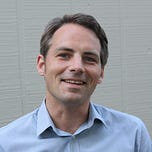





![Moral Treatment [Book] Moral Treatment [Book]](https://substackcdn.com/image/fetch/$s_!VJUY!,w_1456,c_limit,f_auto,q_auto:good,fl_progressive:steep/https%3A%2F%2Fsubstack-post-media.s3.amazonaws.com%2Fpublic%2Fimages%2F44ebc90a-b427-44b5-9c58-65b355385237_880x1360.jpeg)
![The Murmur of Everything Moving [Book] The Murmur of Everything Moving [Book]](https://substackcdn.com/image/fetch/$s_!A250!,w_1456,c_limit,f_auto,q_auto:good,fl_progressive:steep/https%3A%2F%2Fsubstack-post-media.s3.amazonaws.com%2Fpublic%2Fimages%2Fa137d413-5b27-4c35-86c6-3dd46e72c262_1730x2560.jpeg)

